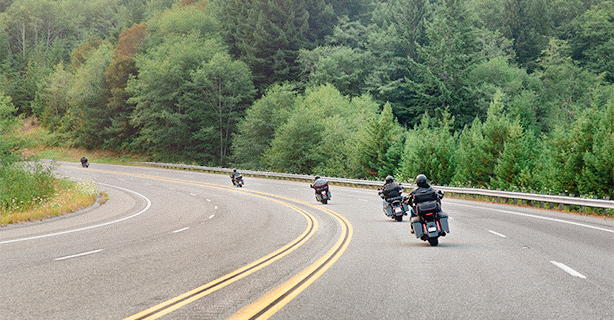0 min. read
Whether you’re going coast-to-coast or heading to a far-away rally, a long-distance tour is an exciting adventure. Since the earliest days of riding, even before the modern road system existed, motorcycle riders have tested themselves and their machines on long journeys. More than 100 years later, modern motorcycles and roads have made long-distance travel much more comfortable. But our motorcycles still need proper maintenance to safely go the distance.
Preparing for your long-distance motorcycle trip
Long motorcycle trips are usually preceded by a lot of planning. In preparation, you’ll probably be poring over maps and guidebooks, making reservations, and crafting a list of places to visit and sights to see.
But don’t forget, your motorcycle needs some pre-trip planning, too. Consider this list as a starting point:
Think ahead: If a scheduled mileage-interval service will be due during your trip, have it done before leaving.
Change it up: Change your oil, oil filter, and fuel filter.
Go the extra mile: Get a professionally performed motor tune-up and chassis inspection.
Check your tires: Inspect and replace tires before the trip if they will be near their service limit during the trip.
Look everything over: Inspect any installed aftermarket accessories, including luggage systems.
Be prepared: Include motorcycle care items on your packing list, such as:
Tire pressure gauge
Tire tread wear gauge
Toolkit
Oil and small funnel
Travel-sized cleaning supplies
While you're on the road
Developing a daily routine of motorcycle maintenance while traveling goes a long way toward avoiding unexpected breakdowns. Looking over your bike every day can impart a sense of pride and confidence before hitting the road.
Each morning, perform a thorough T-CLOCS inspection:
Tires and wheels
Controls
Lights and electrics
Oil and other fluids
Chassis
Stands
After the first few miles in the morning, refuel instead of waiting until the end of the day, and perform the following:
Check motor oil at full operating temperature
Recheck luggage packing and load balance
At every gas stop:
Check the motor oil
Check to make sure gear is properly secured
Walk around your motorcycle and perform a brief visual inspection
At the end of the day:
Clean off any bugs and debris from the lights and windshield
Pick a secure parking place
Lock and cover your motorcycle
Check the ground under your motorcycle so you’ll know if something is leaking when you check back in the morning
Take care of yourself, too
Now we've established that your bike is in top running order. But have you considered how ready you are for the big ride? Let’s look at caring for you—the rider—on a long-distance trip.
Your journey should begin well before you roll out on the road – starting your motorcycle tour well-rested and organized is the best way to go. Here are some things to consider leading up to the big event, starting about two weeks before you leave:
Refill your prescription medications
Fill out a medical and prescription information card
Check your travel-sized personal hygiene items
Get motorcycle inspection documents in order
Finalize arrangements for caring for your home, pets, and plants
Here are some things to tackle one week out from your trip:
Pack everything except your first day of riding gear
Make sure your gear fits you and fits on the motorcycle
Leave room to spare
With just two days out, you should do the following:
Inspect your motorcycle
Pack the motorcycle
Prep your riding gear
With everything ready, you can sleep peacefully before your journey begins.
Check in on yourself
Now that you’ve started your trip well-rested, it’s time to think about maintaining yourself while on the road:
Keep first-day mileage within reason: This allows your body to ease into the journey, especially if you haven't gone long-distance in a while.
Know it’s a tour, not a marathon: Get to know the daily mileage that works best for you.
Take rest stops: Stop and walk around. This can reduce cramps and stiffness. Plus, it gives you the opportunity to explore new places.
Eat a good breakfast every day: Include protein and fiber in your meal, avoiding empty carbs that will leave you feeling hungrier sooner.
Stay hydrated: Drink water throughout the day.
Avoid heavy foods: Eat a light lunch or several small snacks during the day, as heavy foods can make you sleepy.
Take a sunset break: Your circadian rhythms may make you feel sleepy as the light fades at sunset. This is a good time to get off the bike and move, walk, stretch, and get reinvigorated.
Know when to say when: Dinner can be your largest meal of the day. Enjoy but don’t overindulge, especially with alcohol.
Take a stroll: A good stroll after dinner helps ease any stiffness from the day in the saddle.
Review and look ahead: At the end of each day, review the day’s ride and adventures. Think about your plans and route for the next day—and don’t forget to check the forecast.
Get some sleep: The value of a good night’s sleep is often overlooked, so balance your schedule accordingly.
Sleep, eat, and ride—repeat as needed on the journey. Enjoy the adventure with great energy and good health.
Till next time, ride safe!
Related links
If you enjoyed this piece on long-distance riding tips, you might also enjoy other motorcycle safety tips we have featured in the Safety section of our Resources library.
We feel strongly about your safety and promote it through our Rider Training Course discount. Check it out.
La información general contenida en este blog tiene únicamente fines informativos o de entretenimiento. Vea el descargo de responsabilidad de nuestro blog.
*La exactitud de los datos está sujeta a la fecha de publicación de este artículo.







